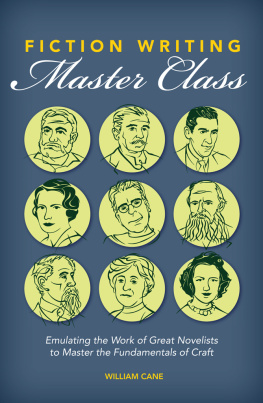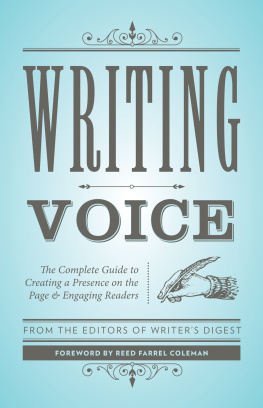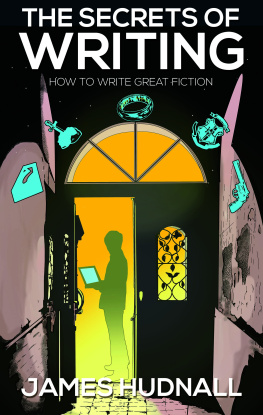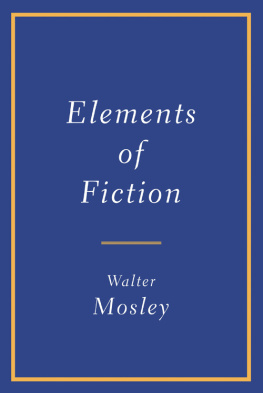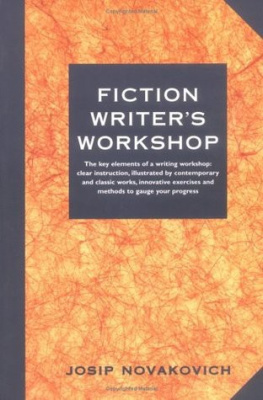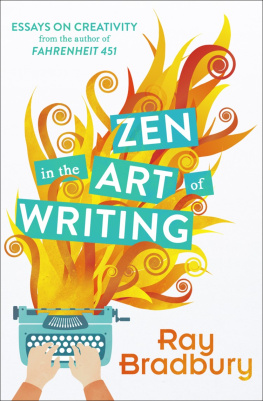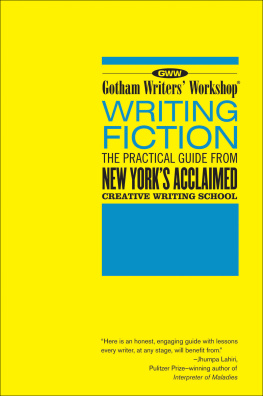Contents
Guide
FICTION WRITING
Master Class
Emulating the Work of Great Novelists to Master the Fundamentals of Craft
WILLIAM CANE

www.writersdigest.com
Cincinnati, Ohio
DEDICATION
For Marilyn, my wife,
Who ate up my words,
And Kate, my daughter,
Who often ate the manuscript.
TABLE OF Contents
INTRODUCTION
So many people today are banging their brains out against their keyboards and asking themselves, Why cant I write like the greats? when the simple answer is that you can. First, though, you need to come to grips with the fact that the greats were educated quite differently from you and me.
Unfortunately, during the past eighty or so years writers have not received instruction in a vital training method that their predecessors routinely employed to improve their skills. Indeed, this neglected technique is one of the most important training methods ever developed for writers, a technique which was used with spectacular results for two thousand years but which was suddenly dropped from the curriculum. Almost every great writer studied these methods, but you were probably denied access to them by a recent change in our educational system. Chances are that when you discover this lost technique, and practice this forgotten art, the experience will have an explosive impact upon your writing and will do for you what it did for Chaucer, Shakespeare, Milton, Pope, Swift, T.S. Eliot and countless others, infusing new life into your work and jump-starting your creative career.
Wouldnt you like to know the biggest difference between your education and that of these well-known writers? Im going to tell you in a moment, but first let me ask one question. How often did you hear the word originality mentioned when you were in school? In other words, how frequently were you urged to do new work, break new ground, and write in your own voice? Like most students you were probably slapped silly by demands that you avoid plagiarism, be authentic, and above all do original work. Let me hear your voice! professors would say. Most of us can still hear the echoes of those demands ringing through the halls of academia.
And that, believe it or not, is the problem.
You cannot become a terrific writer justpoof!out of thin air. It takes something preexisting, some structural savvy, some foundation in technique, some underlying sense of the possibilities of language before you can strip off your topcoat and tap dance across the pages like Fred Astaire.
Before I explain exactly what was left out of your education, let me tell you how I stumbled upon this deplorable state of affairs in the first place. It all started in those long years before I went to law school, years when I roamed the musty library stacks during my stint in college. Because I was president of the debating society, it was my job to dig up as much evidence as I could against the other teams. So I would stand for hours sifting through government documents on the sweltering third floor of the library at Boston College. Then, for fun, because I was also working at the college radio station, I would browse around looking for material that I could use in the radio plays I directed. And it was in this manner that one evening I stumbled upon a shelfactually shelves upon shelvesof books about ancient rhetoric. It turns out that these dusty volumes contained a gold mine of ideas that we could employ in various soap operas which we broadcast to a small group of loyal listeners.
But the other thing I discovered was that this subjectthe subject of ancient rhetoricwas not being taught in any college writing classes; not, at any rate, in any that I could find. Rhetoric had been relegated to the speech communications department, where we got some pretty tedious lectures on Aristotle, Cicero, and Quintilian. The upshot of my little digression is that rhetoric is the subject that has been neglected in writing education; indeed, according to Edward P.J. Corbett, widely regarded as the most accomplished living scholar in this field, the key components of rhetoric were phased out of American education around 1930.
Why should you care whether rhetoric was phased out? After all, isnt rhetoric simply sound and fury signifying nothing but persuasion? Sure, it may be that, but its also much more than verbal volleyball and pontificating propagandism. Rhetoric also encompasses methods of being felicitous with words as well as techniques for mastering style. In its purest form rhetoric also deals with the arrangement of material and the selection of topics for clear, artful, entertaining presentation. Rhetoric, among other things, teaches how to contrive an introduction that will seduce a reader, take him by the nose, and never let him go until he reaches the last paragraph. You want to do that dont you? Of course you do!
Allow me, then, to introduce you to one aspect of rhetoric, one teensy-weensy aspect of it that can literally salvage your writing career, infuse your style with new vim and vigor, and give you a voice equal to the voices of the best and brightest who came before you. Its all in this book about the classical rhetorical technique of imitation. Yes, this is a book about imitation, a method of writing instruction that has dropped off the map, fallen through the floor, and disappeared from the face of the earth as far as modern education is concerned.
Too simple to be true? Well, consider for a moment that musicians, such as the Beatles or the Beach Boys, or whoever else you download onto your iPod, learned their craft by doing covers of other artists songs. Put more simply, they began their own careers by imitating the work of other artists. Only after they had mastered these basics did they venture to write their own material. Why, then, arent writers allowed to do the same? Why arent they instructed and encouraged, for heavens sake, to do the same? Thats the lesson taught by the classical technique of imitation.
And thats the lesson of this book. You too can imitate the greats, and in the process absorb elements of their style that will make your writing sing. The point is that the rhetorical device of imitation will help you grow as a writer, just as it helped Milton, Melville, Flaubert, Faulkner, Dickens, and Shakespeare. More importantly, you cannot expect to reach your full potential as a writer unless you learn to absorb from other writers by using the technique of imitation.
This book explains this time-tested method of improving your output that modern writers never learned in school, a method of helping you write better that can work wonders and transform producers of plodding prose into Salingers, Hemingways, and kindred butterflies, all of whom flutter through their stories as if doing so were the easiest thing in the world. To be sure, the techniques taught in this book will help you in your work like nothing youve ever learned before. As a professor of English, Ive used these techniques to coach a generation of students. I know these methods work, and by the end of the book so will you.
The chapters that follow will make up for what you missed in school. Im going to introduce you to the classical device of imitation by examining the work of twenty-one notable writers, pointing out exactly how you can adopt their techniques in your own writing. Like a painter absorbing the elements of style necessary for composition, tint, and tone, youll learn the fundamentals of your craftincluding how to master the essentials of prose rhythm, character portrayal, and story development, among many other topicsso that you can advance in skill and ability and learn from those who have gone before, just as they learned from the greats who preceded them.

